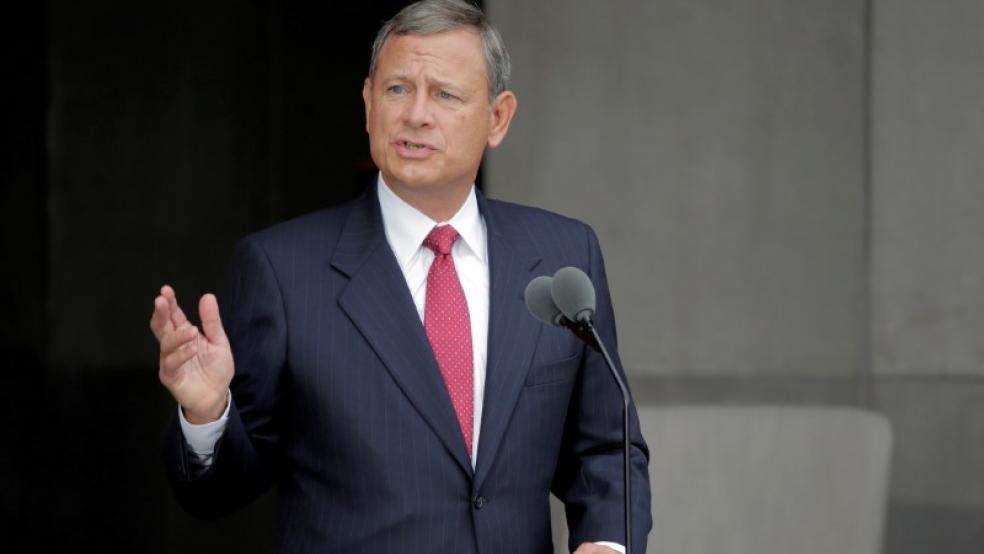WASHINGTON (Reuters) - The Supreme Court appeared closely divided on Monday as it weighed whether to revive President Barack Obama's plan to spare from deportation roughly 4 million immigrants in the country illegally, raising the possibility of a 4-4 deadlock that would block the program.
Based on questions asked during the 90-minute oral argument in a case that tests the limits of presidential powers, the court's four liberal justices seemed poised to back Obama while the four conservatives were more skeptical.If the court is to avoid a 4-4 split, Chief Justice John Roberts could be the most likely member of the conservative bloc to join the liberals in voting to reinstate the program. One possible compromise outcome would be that the court could uphold Obama's plan while leaving some legal questions unresolved, including whether the government can provide work permits to eligible applicants.The court is evenly divided ideologically following the February death of conservative Antonin Scalia. A 4-4 split would leave in place a 2015 lower-court ruling that threw out the president's executive action, which bypassed the Republican-led Congress.The case, one of the biggest of the court's current term ending in June, pits Obama against 26 states led by Texas that filed suit to block his immigration plan.If the court does muster a majority to decide the case, it appeared the justices would resolve the merits of the legal claim instead of deciding it on the narrow procedural question of whether the states had legitimate grounds to sue. Texas said it had "standing" to sue because it would be hurt by the additional costs it would incur by providing driver's licenses to those who obtain legal status.Roberts asked tough questions of the Obama administration on that point, but seemed less aggressive on whether the government had the authority to implement the program.Conservative Justice Anthony Kennedy, who frequently casts the deciding vote in close cases, expressed concern that the administration had exceeded its authority by having the executive branch set immigration policy rather than carry out laws passed by Congress.For the president to take action ahead of Congress is "just upside-down," he said.Among the liberals, Justice Ruth Bader Ginsburg noted the "basic problem" that the government does not have the resources to deport all of the estimated 11 million people who live in the country illegally, meaning it must set priorities."There are these people who are here to stay no matter what," Ginsburg said. Obama's plan was tailored to let roughly 4 million people - those who have lived illegally in the United States at least since 2010, have no criminal record and have children who are U.S. citizens or lawful permanent residents - get into a program that shields them from deportation and supplies work permits.The program is called Deferred Action for Parents of Americans and Lawful Permanent Residents (DAPA).Texas Solicitor General Scott Keller conceded to the justices that the federal government has the power to defer action on deportations to large groups of people, but said the government cannot grant them work permits or other benefits.In defending the plan, U.S. Solicitor General Donald Verrilli said the federal government has regularly launched programs aimed at giving large groups of immigrants temporary legal status as part of its role establishing enforcement priorities due to limited resources.Asked if the government has the power to allow all immigrants who are in the country illegally to stay, Verrilli said: "definitely not."On a sunny spring day in the U.S. capital, more than a thousand demonstrators, most supporting Obama's action, gathered outside the courthouse. The lively music of a mariachi band and chants of "We're home and here to stay, undocumented and unafraid," filled the air.OBAMA'S PLAN BLOCKEDObama took the action after House of Representatives Republicans killed bipartisan legislation, billed as the biggest overhaul of U.S. immigration laws in decades and providing a path to citizenship for illegal immigrants, that was passed by the Senate in 2013.Shortly before the plan was to take effect last year, a federal judge in Texas blocked it after the Republican-governed states filed suit against the Democratic president's executive action. The New Orleans-based 5th U.S. Circuit Court of Appeals upheld that decision in November.The Supreme Court's ruling is due by the end of June.Obama's action arose from frustration within the White House and the immigrant community about a lack of action in politically polarized Washington to address the status of people, mostly Hispanics, living in the United States illegally.The court will decide the case at a time when immigration has become a contentious issue in the U.S. presidential campaign, with leading Republican candidates calling for all of the estimated 11 million people in the country illegally to be deported.Obama, who has seen many of his major legislative initiatives stifled by Republican lawmakers, has drawn Republican ire with his use of executive action to get around Congress on immigration policy and other matters including gun control and healthcare. (Reporting by Lawrence Hurley; Additional reporting by Clarece Polke and Robert Iafolla; Editing by Will Dunham)Supreme Court appears split over Obama's immigration plan

Carlos Barria



